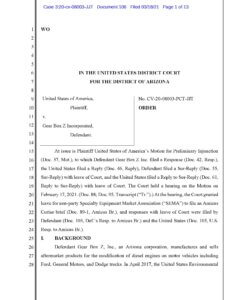United States of America v Gear Box Z Incorporated
United States of America v Gear Box Z Incorporated
United States District Judge Jon Tuchi issued a preliminary injunction against Gear Box Z on March 17, 2021 prohibiting them from selling their tuning, delete and defeat devices.
Gear Box Z tried to defend themselves by claiming that their tuning, delete and defeat devices fall into three categories of exemptions to the Clean Air Act:
Gear Box Z Incorporated claimed a Maintenance Exemption for its products
The Clean Act Act allows for a Maintenance Exemption using this language:
No action with respect to any device or element of design referred to in [§ 7522(a)(3)] shall be treated as a prohibited act under that paragraph if (i) that action is for the purpose of repair or replacement of the device or element or is a necessary and temporary procedure to repair or replace any other item and the device or element is replaced upon completion of the procedure, and (ii) such action thereafter results in the proper functioning of the device or element referred to in [§ 7522(a)(3)].
The Court found:
“Although the United States has the burden to show a likelihood of success on the merits to obtain the requested injunctive relief, the burden of proof applicable to an exception to a CAA prohibition lies with Defendant
Defendant has pointed to no evidence that, under the statutory exception, its products were designed “for the purpose of repair or replacement” of a device or element in compliance with the CAA regulations, or for “a necessary and temporary procedure to repair or replace any other item.” This failure of evidence alone is fatal to Defendant’s claim that it can demonstrate that the maintenance exception applies to its products.
The United States has produced evidence that the design of certain of Defendant’s products indicates that their installation is not intended to be reversed. For example, through an examination of the source code, it is evident that Defendant did not design its software to reverse the changes it makes and return the vehicle back to the EPA-certified condition.
Defendant’s responses to customer requests about what Defendant’s product line can do have included statements such as, “Not only will you see an increase in mileage, but it will give you around 70 more [horsepower] which is really handy for towing.” And, “On average we are seeing a 20% increase in fuel mileage and power, but each truck is different.” No customer evidence before the Court indicates customers have actually used Defendants’ products for maintenance and repair. For all these reasons, Defendant has not shown the maintenance exception applies to its products.”
Gear Box Z Incorporated claim a Reversibility Exemption for its products
“Defendant contends that its hardware and software products can be used for the repair of a motor vehicle and can be removed or reversed, and thus, under the maintenance exception, the products are not prohibited by the CAA.
In response, the United States argues that Defendant’s products are not designed for “necessary and temporary” repair procedures; the products are not designed such that their installation is to be reversed; and even if use of the products is reversible, the statute requires that the changes made using the products are actually reversed, resulting “in the proper functioning” of the original emissions controls, which changes using Defendant’s products are not.”
Gear Box Z Incorporated claimed a Motor Sports Exemption
“Indeed, the Amicus Curiae brief and its responses examine this question in great detail. But Defendant has not produced a single piece of evidence that a single one of its products has been used on a motor sports vehicle (or an emergency or military vehicle, for that matter). By contrast, the United States has produced ample evidence, as was its burden, that Defendant’s products are used in motor vehicles as contemplated by the CAA.
Defendant also suggests that the United States cannot show that Defendant “knows or should know” that its products are “being offered for sale or installed” as defeat devices, as required by the CAA.
Defendant’s suggestion is belied by its own statements in response to customer questions on its website and on social media platforms. Defendant’s own product manuals and advertisements also demonstrate that Defendant knows its products are installed as defeat devices.
Defendant cannot claim a lack of knowledge simply by not keeping sales records, and the evidence clearly shows that Defendant knows the purpose of its products is for use as defeat devices.”
Posted on by Rick Muscoplat
